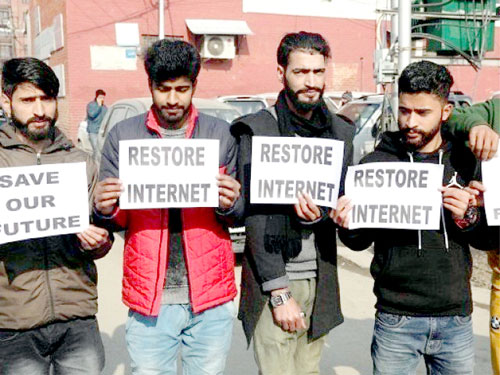Even as the current Indian government has taken a lead to expand digital footprints, experts say that excessive regulations and censorship were staring at the face of the country.
Speaking to Anadolu Agency on the eve of World Day Against Cyber Censorship, which is being observed on Saturday Geeta Sesu, the co-founder of FreeSpeech Collective – an advocacy group for freedom of speech based in New Delhi – said the internet shutdowns are imposed often for some absurd reasons.
“Just two days ago, a shutdown was imposed in parts of West Bengal state to curb cheating in school examinations,” she said, adding that excessive regulations, censorship is affecting digital freedoms in the country.
According to research conducted by the UK-based privacy and security research firm Top10VPN, India had suffered the largest economic impact in the world in 2020 due to internet shutdowns.
Internet blackouts, social media shutdowns, and bandwidth-throttling by the governments cost the global economy $5.5 billion in 2021, according to Top10VPN.
According to a report published by an Indian parliament panel, the telecom operators reportedly lose 24.5 million rupees per hour ($321,118) in every circle area where there is a shutdown or throttling.
Records of India-based internet tracker Internet shutdowns.in shows that since 2012, the country has seen over 500 internet shutdowns, and the intensity of the shutdown was higher from 2018 to 2020.
Sesu alleged that the shutdowns are “arbitrary” they do not follow any legal norms and are ostensibly a measure to tackle law and order issues, but actually, they are used to keep citizens in check.
“The unprecedented shutdown of all communication in Indian Illegally Occupied Jammu and Kashmir (IIOJK) on the eve of the abrogation of Article 370 in August 2019, resulted in an information blackout and crippled the media,” she said while referring to the longest shutdown, in occupied valley, when India stripped special constitutional status of the region. According to Sesu, greater awareness and more digital literacy are needed to deal with issues like fake news, which is often the reason the administration gives for ordering the shutdown.
“If we want to claim ourselves as a mature democracy, we have to take our citizens into confidence and trust them, not throw them into an information blackout at the first sign of trouble,” she said.
Torsha Sarkar, technology law and policy researcher at the Centre for Internet and Society, told Anadolu Agency that while the frequency of internet shutdowns seems to be on the higher side, there have been a few significant developments on the regulatory front that are “worth considering.”
Last year, India’s parliamentary standing committee on Information Technology, in its report Suspension of Telecom and Internet Services and Its Impact, had called for defining the parameters and setting up of a robust mechanism for internet shutdowns.—AP










